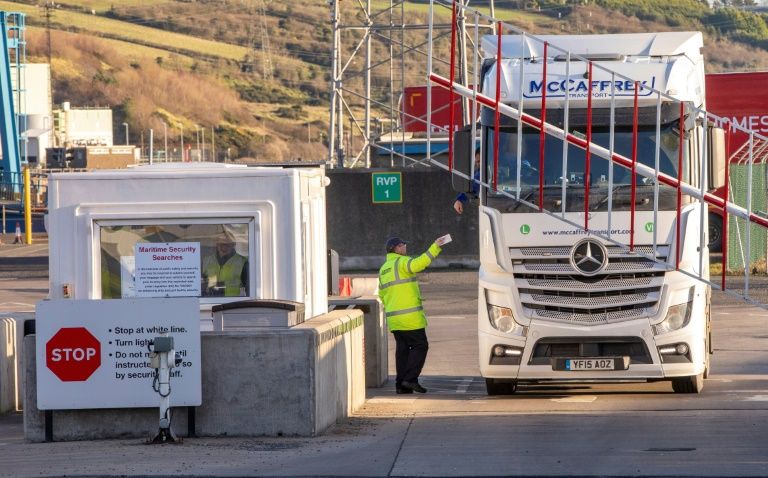Brexit trade talks on line as time runs out
Brussels (AFP) – Hopes of an imminent breakthrough in post-Brexit trade talks between the EU and UK faded Monday, despite diplomats warning that any deal must be found before this week’s European summit.
Chief EU negotiator Michel Barnier told MEPs that Wednesday was the effective deadline for a solution as intense but inconclusive talks with his UK counterpart David Frost dragged on in Brussels.
Barnier and Frost crossed swords once again on Monday before reporting back to their respective bosses, EU Commission chief Ursula von der Leyen and UK Prime Minister Boris Johnson.
The president of the European Council held a video call with von der Leyen, President Emmanuel Macron of France and Germany’s Chancellor Angela Merkel to discuss the agenda of Thursday’s summit, including Brexit.
And Johnson and von der Leyen were to speak later on the telephone, a call that diplomats said would take stock of the talks and could decide whether or not to press on.
Barnier told a briefing of EU envoys that negotiations were still blocked over fishing rights, rules for fair trade, and an enforcement mechanism for Britain’s regulatory standards which are still the thorniest problems eight months after talks began.
All eyes are on the EU summit on Thursday, when the outline of a deal — or an admission of the failure to find one — will be put to the bloc’s 27 leaders.
A senior EU diplomat said the leaders would either “welcome a deal” if there was one there, or demand urgent contingency measures in the event talks failed.
“These are going to be decisive hours for the future of our UK relations, and I guess we are at the ‘make it or break it’ moment,” the diplomat told reporters.
Ratcheting up the drama, Michael Gove, a top UK minister and close ally of Johnson, was sent to Brussels for separate talks to discuss implementing the existing divorce treaty.
After a meeting with EU vice president Maros Sefcovic, the UK government said it was ready to revoke clauses in Brexit legislation that have provoked legal action by the EU and undermined trust in London.
It was not clear if this was meant as an olive branch by the UK in the trade talks, and London said the measures would stand if no trade arrangement was found.
– ‘Very gloomy’ –
Ireland’s Foreign Minister Simon Coveney told RTE News that Barnier was “very gloomy” and was “obviously very cautious about the ability to make progress today.”
Time is pressing with European officials arguing that Brussels needs at least two weeks to ratify an accord before the UK leaves the EU’s open trade area, known as the single market, on December 31.
Britain left the EU on January 31 but will exit the single market at year’s end, following a transition period originally intended to give time to shape future ties.
The goal of the negotiations is to establish a trade relationship with zero tariffs and zero quotas in hopes of avoiding major disruptions come January 1.
Most sources agree that the hardest issue was how to guarantee fair trade in future ties and establish a quick penalty mechanism if either side were to backtrack on, for example, environmental or health standards.
The EU fears Britain slashing its regulations, which could allow its companies to undercut European firms.
But Britain is very reluctant to accept a broad and binding arrangement, seeing it as an infringement on its new-found sovereignty after 47 years of EU membership.
Fishing also remains a sticking point with complaints that the UK side toughened its demands after reports said that a breakthrough was imminent.
The UK side “is pushing the EU to pull the plug, but I don’t think they will do that,” an EU diplomat said.
“Maybe we need a ‘no deal’ to get a deal,” he said.
France is seen as the most reluctant to compromise among the Europeans after repeated threats of a veto if a deal does not protect French interests.
– ‘Meet again’ –
Johnson boasts Britain will “prosper mightily” whatever the outcome of the talks and ruled out any request for a longer transition, which he refused to do when he had the chance last year.
Asked whether talks might continue next year to avoid a cliff-edge divorce on December 31, a UK spokesman said: “I can rule that out.”
Unless the EU gives ground on the main outstanding issues, Johnson believes “it won’t be possible to reach an agreement” and Britain will do fine on stripped-down trading terms, he said.
Without a deal, tariffs would be levied on the huge volumes of trade passing between the UK and the European continent, through the Channel tunnel and by ship, starting on January 1.
Travellers between both sides would also be affected with further passport delays and red tape for foreign residents and businesses.pvh
Disclaimer: Validity of the above story is for 7 Days from original date of publishing. Source: AFP.


